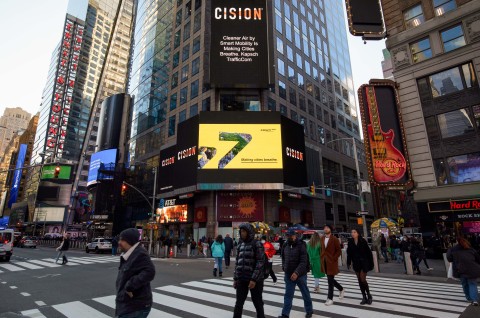COP26 Emissions Targets Need More Than Double - OPINION by Kapsch TrafficCom
The Glasgow Climate Pact is ambitious, but not enough. Commitments amount to 4.8 billion mt of CO2, while they need to fall by 12.5 billion mt in 2030 to get on track with a 2°C goal, according to the UN. For cities, the main drivers of emissions, digital traffic management is a valuable tool to reduce emissions while improving air quality. Cities like Austin or Madrid already take action and benefit from such measures today.
This press release features multimedia. View the full release here: https://www.businesswire.com/news/home/20211124005869/en/

Check out more information on our Breathe-Campaign here: https://www.kapsch.net/en/ktc/breathe (Photo: Business Wire)
The recently adopted Glasgow Climate Pact is an ambitious attempt to set targets for reducing emissions – but most countries are way off track in terms of meeting them. In fact, in order to achieve a warming limit of 1.5°C, efforts to curb emissions would have to reach 27 billion mt CO2 by 2030.
In addition to being a major source of emissions that are damaging the environment, urban transport is also responsible for air pollution in cities.
Kapsch TrafficCom is making cities breathe again
“Today, more than 80% of cities worldwide struggle with air pollution,” explains Georg Kapsch, CEO of Kapsch TrafficCom. “The impact on the environment and public health cannot be denied. Promising to focus on electric vehicles in the future is not enough and will by far not resolve the situation – immediate actions are required. By making use of the increased connectivity of infrastructure elements and traffic participants, joined-up traffic management can help cities to better guide traffic and reduce emissions-heavy congestion.
The impact of traffic management
In Austin, Texas, the implementation of managed lanes has improved throughput leading to reduced traffic congestion and increased revenue generation for the city. In Madrid, Spain, Kapsch data shows that Integrated Mobility Management has reduced delays and stops by 19% and journey times by 5%.
Additionally, by employing joined-up traffic management measures like congestion charging, CO2 emissions in the city of London could be reduced by up to 20%, according to an independent assessment.
Check out more information on the Breathe-Campaign by Kapsch TrafficCom here: https://www.kapsch.net/en/ktc/breathe
FULL TEXT press release for download:
https://www.kapsch.net/en/ktc/info-point/press/ktc-20211124-pr-en
Follow us on Twitter and LinkedIn
Kapsch TrafficCom is a globally renowned provider of transportation solutions for sustainable mobility: www.kapsch.net/ktc
View source version on businesswire.com: https://www.businesswire.com/news/home/20211124005869/en/





